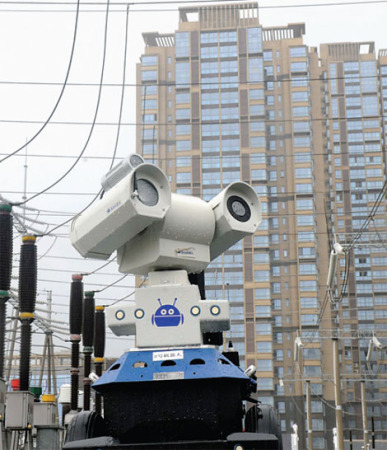
A robot monitors power-transmission equipment during a rainstorm in Chuzhou, Anhui, on Aug 10. (Photo/China Daily)
"A precondition for computers to accurately simulate a real production scenario is that the entire production line must be fully automated, or completely controlled by the computer," Song said. "Developed countries such as the US, Japan and South Korea have accumulated enough data for smart manufacturing after spending many years developing the use of robotics, while China is a beginner at this stage."
Despite being a latecomer, China is not resigned to being a follower: a robotics industry guideline published by the Ministry of Industry and Information Technology in early 2014 spelled out two major objectives for the industry: meeting the huge market demand for low-end robots, and developing high-end robots.
"Low-end robots will be used to replace the missing humans and solve China's labor-shortage problem. In the meantime, it's equally important that we develop our own high-end robots and collect more data from increasingly automated production so we will be able to develop our own smart manufacturing," Song said.
A future dilemma
Since the very beginnings of robotics research, concerns such as those related in Aesop's fable The Farmer and the Snake-about a farmer who tries to save a freezing snake by placing it in his jacket, only to be fatally bitten when the animal recovers-h(huán)ave never been far from people's minds.
In December, the British scientist Stephen Hawking told the BBC that the development of full artificial intelligence could "spell the end of the human race". A month later, Microsoft's Bill Gates said humans should be worried about the threat posed by artificial intelligence.
What makes Hawking and Gates so nervous is not the sight of the endlessly repetitive robotic arms on production lines, but the dream of the founders of robotic science: the creation of a machine capable of independent sensation, thought and action.
"If we feel the wind is rising, we consider putting on a coat, and then we get a coat and put it on. In the past few decades, what we have done in robotics development has focused on giving robots the ability to grab a coat and put it on-the ability to act-but we have not given them the ability to perceive and think, which is the most difficult part," Xu Yangsheng, a member of the Chinese Academy of Engineering, told the 2015 China Conference of Artificial Intelligence, held in Beijing on July 25 and 26.
"Now is the time to be open to the idea of creating intelligence for robots," he said.
Artificial intelligence research began at a 1956 conference at Dartmouth College in the US, and early pioneers were convinced that it would only take a few decades to build a machine as intelligent as a human being.
That vision later proved to be a serious underestimation of the complexity of the task, and AI development entered a slow phase.
However, fast-paced improvements in hardware and the relatively recent development of big data-large, complex sets of data that can provide insights that lead to better, more accurate decision-making-h(huán)ave brought hope for the future of AI. Between 2009 and 2013, about $17 billion was poured into the global AI sector, which grew at more than 60 percent a year, according to a 2014 report published by the quantitative analysis company Quid.
"The development of the Internet and big data has brought a new spring for the development of AI, because big data on the Internet provides plenty of materials for AI, and thus promotes the comprehensiveness and accuracy of its learning ability," said Tan Tieniu, deputy secretary-general of the Chinese Academy of Sciences.
"However, it's still too early to say that robots are becoming smarter than humans because there's still a long way to go before we come close to developing a general-purpose AI," he said.
Technological advances have enabled robots to outperform humans in a number of specific fields, such as face and voice recognition and piloting aircraft, but as yet no one has figured out how to incorporate these abilities into one device.
"AI represents the direction of future development. I don't believe that AI will surpass the human race, but it will influence our society, so it's high time for us to start AI research from the perspective of the social sciences," Tan said.
"An Chinese old maxim says: 'Water can float your boat, but it can also sink it', so whether AI will turn out to be a demon will depend heavily on how we handle its development."


















































